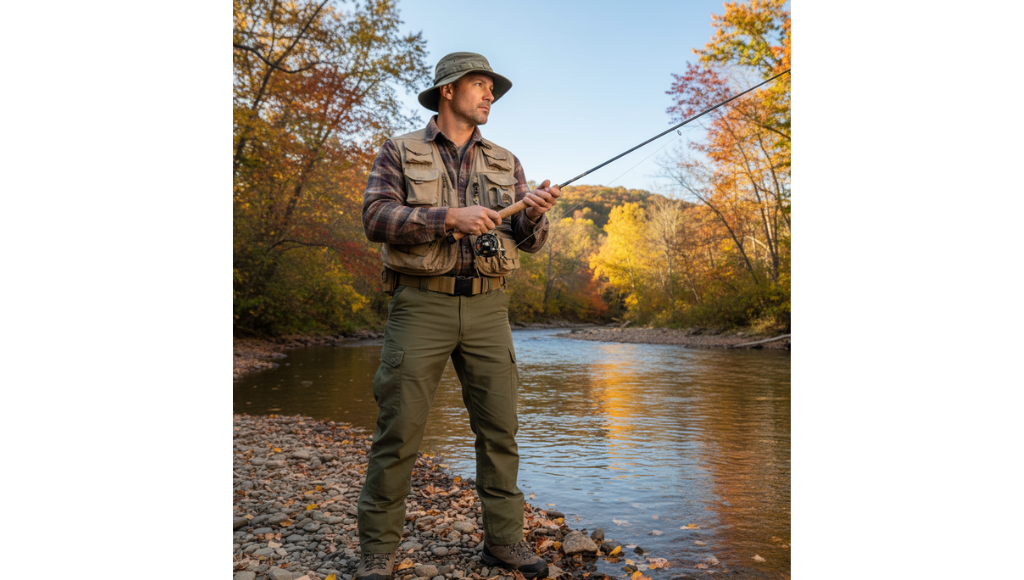
The Ultimate Outdoor Fishing Gear Guide — What to Bring and Why
Share
Heading out for a day of fishing is simple — until you realize you forgot that one essential item. Whether you’re shore-fishing a quiet river, casting from a kayak, or stalking bass from a small boat, choosing the right outdoor fishing gear improves comfort, safety, and catch rate. This guide walks through essential gear, gear-for-purpose recommendations, and a few pro tips — including why a tactical belt can be a surprisingly useful piece of fishing kit.
Core gear every angler needs
Rod & reel combo — Match rod action and length to your target species and techniques (light action for panfish, medium-heavy for bass, heavier for saltwater). Look for corrosion resistance if you fish saltwater.
Line & terminal tackle — Spool quality monofilament, fluorocarbon leader where needed, and pick hooks/sinkers appropriate to your bait and presentation. A neat tackle box or modular chest keeps things organized.
Tackle storage — Waterproof tackle bags, tray boxes, and compact lure organizers make access faster. For kayak or boat anglers, secure boxes that won’t slide are best.
Proper footwear & clothing — Quick-dry fabrics, breathable layers, hat, and polarized sunglasses (for fish spotting) are non-negotiable.
Safety & electronics — PFDs for boat/kayak, a basic first-aid kit, and a portable fish finder or GPS for serious anglers.
Specialty gear by fishing style
Shore / bank fishing: Lightweight telescoping rods, small tackle boxes, and a foldable stool.
Boat & kayak fishing: Rod holders, waterproof containers, and tiedown straps.
Fly fishing: Fly vest or pack for quick access to flies, nippers, and leaders.
Saltwater: Corrosion-resistant reels, braided line, and sacrificial anodes for longer setups.
Why consider a tactical belt for fishing?
A tactical belt (or heavy-duty EDC belt) is built to carry gear securely and can be adapted for fishing use. Benefits include:
Tool & accessory carry: Clip on pliers, small tackle pouches, retractors for nippers, or a knife.
Stability: Reinforced webbing keeps your gear from sagging even when carrying multiple pouches.
Quick access: Unlike a backpack, tools on a tactical belt are immediately reachable — useful when landing a fish with one hand.
Choose a low-profile tactical belt with rust-resistant hardware and modular attachment points for the best fishing experience.
Practical packing checklist (day trip)
Rod + spare line
Tackle box with lures & hooks
Pliers, nippers, multi-tool (belt-mounted)
Extra bait, leaders, and weights
Hydration + snacks, sunscreen, insect repellent
PFD (if on water), phone in waterproof case
Care & maintenance tips
Rinse gear with fresh water after saltwater trips, dry thoroughly, re-lubricate reels seasonally, and inspect tackle for rust. Store rods vertically and avoid long-term UV exposure for plastics.
Quick buying tips
Prioritize durability for saltwater and weight for long walks.
If you carry accessories, get a tactical belt or modular pouch system rather than stuffing pockets.
Test gear ergonomics: can you cast, reel, and land comfortably for hours?
Good gear makes fishing more fun — and safer. Start with the essentials above, then add specialty pieces (like a tactical belt for hands-free tool access) as your needs grow. Browse [your shop/collection link] to find rods, reels, and fishing-ready tactical belts built for outdoor use.

